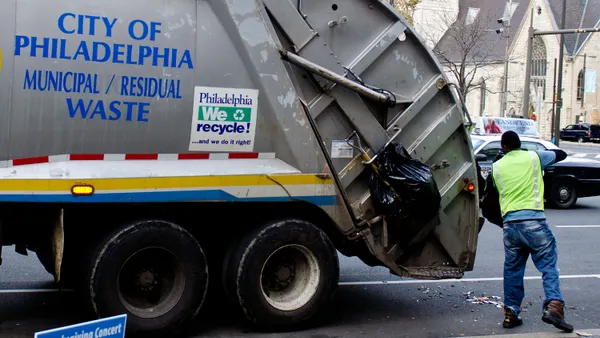Dive Brief:
- The U.S. Department of Labor's Occupational Safety and Health Administration (OSHA) signed a two-year alliance agreement with the National Waste & Recycling Association (NWRA) and Solid Waste Association of North America (SWANA) on Friday.
- All three parties pledged to collaborate on safety-oriented public education and information sharing within the industry. This will entail ongoing stakeholder meetings, conference appearances and member surveys, among other initiatives.
- This new alliance will focus on pressing topics including backovers, distracted driving, needlestick injuries, temperature stress, musculoskeletal injuries and slips, trips and falls. Outreach will be focused on small- and medium-sized employers.
Dive Insight:
OSHA's Alliance Program was founded in 2002 and included 245 active partnerships as of FY18. This marks the first time any associations from the waste industry have signed such an agreement with the agency. The Institute of Scrap Recycling Industries signed an agreement with OSHA in 2015. Other industrial sectors currently participating in the Alliance Program include construction, chemicals and oil and gas.
While waste and recycling organizations have collaborated with regulators in the past, this marks a new step. NWRA's Kirk Sander, a former OSHA chief of staff, told Waste Dive last year he viewed such collaborations as a useful tool. The oil and gas industry's work with OSHA and the National Institute for Occupational Safety and Health was cited as a particularly successful model.
Sander, now NWRA's chief of staff and vice president of safety, said it was important for industry to engage with OSHA rather than shy away.
"Our joking tagline for OSHA was, 'nail salons to nail guns,'" he said at the time. "So if you think about what an OSHA inspector in a month could encounter, you want to have those conversations with OSHA so they recognize your industry and they understand the uniqueness of your industry."
One of the new alliance's goals is to encourage both NWRA and SWANA members to be more communicative with local OSHA offices and participate in voluntary programs.
Fatalities and injuries can occur at operations of any size, but smaller service providers are seen as being at a disadvantage because they may have more limited resources to invest in safety education and technology. This can apply to public and private sector operations, both of which have experienced fatalities so far this year.
NWRA's membership is specifically private sector companies, and SWANA's includes many public sector professionals, so this new alliance offers a chance to work together on practices more than they may have in the past.
"It doesn't matter whether a solid waste employee is in the public or private sector; our goal is to protect all solid waste workers," said SWANA CEO David Biderman in a statement.
2017 fatality rates for collection workers remained the fifth-highest of any U.S. occupation (10 times the national average), while injury and illness rates for MRF workers were especially high.
Anecdotal reports indicate 2019 will also be a difficult year, but it remains too early for any conclusive analysis from the Bureau of Labor Statistics because of a lag in reporting of injury and illness data collected by the agency. 2018 data will be published later this year.
Correction: A previous version of this article neglected to mention that ISRI was the first recycling trade association to sign an OSHA agreement.










